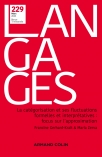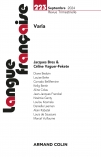
Langages n° 193 (1/2014)
Pour acheter ce numéro, contactez-nous
Recevez les numéros de l'année en cours et accédez à l'intégralité des articles en ligne.
Le verbe coréen alta, précédé d’une proposition nominalisée à l’aide du nom dépendant cwul, peut être interprété aussi bien comme un verbe modal dynamique exprimant une habileté que comme un verbe à modalité épistémique factive, contre-factive ou non-factive. Dans les cas de modalité dynamique ou factive, le nom dépendant cwul peut être suivi de la marque accusative, alors que celle-ci n’est pas admise dans les cas de modalité contre-/non-factive. L’absence de la marque accusative n’entraîne cependant pas systématiquement une interprétation contre- /non-factive. Cette étude met en évidence les paramètres syntaxiques et sémantiques associés à chaque modalité du verbe alta. L’hypothèse défendue est que l’interprétation contre-/nonfactive du verbe alta est liée à la grammaticalisation de ce dernier, qui perd son autonomie syntaxique et entraîne une réanalyse syntaxique et interprétative.
The Korean verb alta, preceded by a proposition nominalized by means of the dependant noun cwul, can be interpreted as a dynamic modal verb expressing an ability as well as an epistemic modal verb expressing factivity, counter-factivity or non-factivity. In the cases of dynamic and factive modality, the dependent noun cwul can be followed by the accusative mark, while in the cases of counter-/non-factive modality, it cannot. However, the absence of the accusative mark does not lead systematically to a counter-/non-factive interpretation. This study identifies syntactic and semantic features associated with each modality expressed by the verb alta. The hypothesis defended is that the counter-/non-factive interpretation of the verb alta is due to the grammaticalization of this verb, which loses its syntactic autonomy and triggers a syntactic and interpretative reanalysis.

